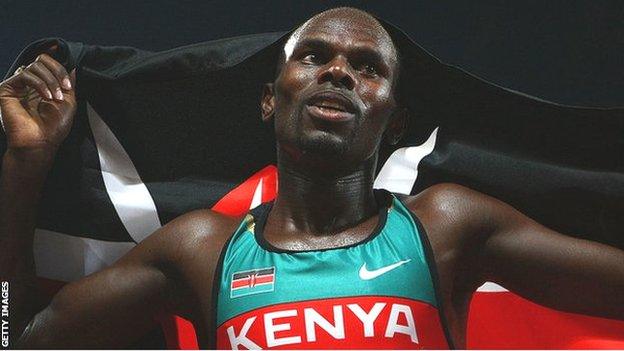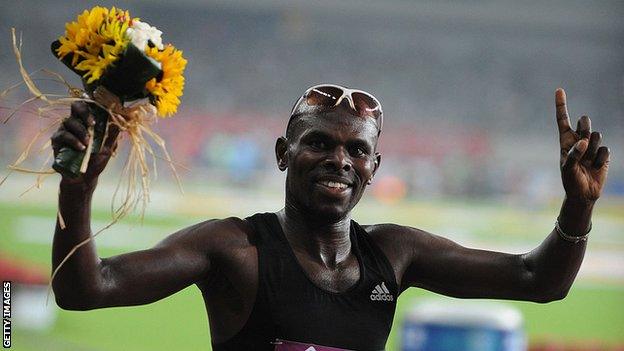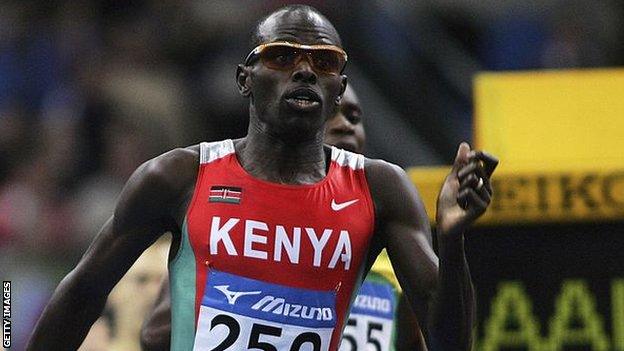Wilfred Bungei: Ex-Olympic champion hopes his battle with alcoholism will inspire others
- Published

Wilfred Bungei of Kenya won Olympic 800m gold in Beijing in 2008
In 2012, Wilfred Bungei should have been celebrating one of the greatest days of his life.
His third child was due. And the Kenyan runner - who had missed the births of his first two children to focus on the athletics career that had brought him an Olympic gold medal - would be able to attend.
But he didn't make it. He had been consumed by the demons of alcoholism that had ravaged his retirement.
That he has fought back from such troubles gives him as great a reason to celebrate as all he achieved on the track.
"I don't celebrate my birthday but I celebrate the day I stopped drinking," Bungei, now 39, told BBC Sport Africa. "It makes me feel proud of myself. It makes me feel I have control over my life."
'I ended up in a ditch'
Having started out as a junior athlete in 1998, Bungei's career reached its pinnacle as he captained Kenya's team at the 2008 Olympics in Beijing, winning the 800m title.
He retired in 2010 - and then drink took hold.
The low point came on that day seven years ago when he was supposed to be at the birth of his child.
He says he reached for the vodka bottle after fooling himself that to prepare to watch childbirth, he needed a drink.
"There was always that lie - 'let me have one or two so that I can have the courage to see is what happening'," he recalled.
"I chose to have a shot of vodka but I ended up drinking over one litre in a short span of time. I don't know what happened, but I do know I ended up in a ditch.
"People actually thought I had died."

Bungei's running career ended in 2010
A year earlier, Kenya's first Olympic marathon champion Sammy Wanjiru - a friend of Bungei - had died after falling off a balcony at his home. There had allegedly been a large amount of alcohol in his system, although the autopsy report was inconclusive.
There have been plenty of murmurings about a drinking culture within sections of Kenya's athletics' community, yet Bungei says that some of those affected are in denial about their problems.
The retired 800m runner acknowledges that he struggled to fill the void in his own life when his sporting highs came to an end.
He says he found it too difficult to handle the amount of free time he suddenly had on his hands, having previously been a full-time athlete.
What makes him stand out is that he is a Kenyan actually prepared to speak out on the subject of alcoholism.
"Some have refused to seek treatment because when it comes to alcoholism, going through rehabilitation is the only true way to heal and know who you are," he said.
'My kids were afraid'
Bungei recalls that, as alcohol took hold of him, his children and partner would fear being around him.
"The kids would always fear to be in the car with me because on several occasions you'd go to a bar and end up driving home," said Bungei, who won 800m silver at the 2001 World Championships, as well as bronze at the 2003 World Indoors.
"You have one too many and you are driving and the kids see what you are doing on the road - it was not safe.
"Once I was involved in an accident and my son said: 'Dad, this is what happened.' Every time they'd see I'd had a bottle or two, they would not want to be in the car and this is the bigger part that affected me."
'The moment that made me say enough'
Alcohol had been affecting Bungei physically as well as psychologically.
"There comes a time that drinking is giving you more pain, physically [so]," he said.
"I can remember there was a time when my body was feeling itchy, I was sweating all over and what was so scary was the hallucinations and the darkness coming.
"I was scared literally and had to be held to sleep - those were the moments that made me say it is enough."
In September 2012, a month after his reign as Olympic champion was ended at the London Games, Bungei called a number he had been given earlier that year.
Soon after, he was checked into a rehabilitation centre in Nairobi, the Kenyan capital.
He left the centre six weeks later. He has not had a drink since.

In addition to his Olympic gold, Bungei won 800m world titles at both outdoor and indoor championships
Bungei knows only too well the difficulties sportspeople can face as they try to adjust from an intense career after retiring.
"Being an athlete, I only had 20 days break per year for some 13-14 years - so when I retired, there was nothing much I was doing," he said.
"I would buy a bottle of wine, sit in the house and before I knew it, it was over. I would send for another one. Just like that - within a year and a half - it had become chaotic and my life really was a mess."
He worries that other athletes may be facing similar challenges.
Michel Boeting, an athletics agent and commentator who knows the Kenyan scene well, agrees that there is a problem.
The Dutchman said: "It's just socially acceptable. Maybe they have friends who work during the week and party hard on the weekend and sometimes it's hard for an athlete to say: 'No, I am not joining you.'
"You have some athletes who will squeeze running into their lives instead of [thinking]: 'How I will organise my life around running?' That happens more these days."
Today, the affable Bungei tries to prevent others suffering from the same problems he did - supporting and guiding professional athletes as they transition into retirement.
"There's a stigma associated with it and that is why I decided to come out despite the fact that I had a name to protect," he said.
"It makes me happy when I share my story and I know it might be able to save someone - that is how I got healed myself."